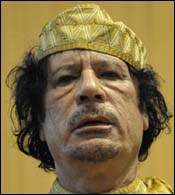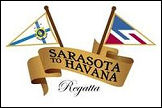 Now that most U.S. citizens appear to have been evacuated from Libya, the White House has begun to re-impose sanctions on Libya, although they are far from comprehensive. On Friday, February 25, President Obama release an Executive Order that blocked the assets of the government of Libya, Colonel Gadaffi and his family and prohibited the provision or receipt of goods, funds or services to and from these entities and individuals. The Executive Order also invoked section 203(b)(2) of the International Emergency Economic Powers Act, 50 U.S.C. 1702(b)(2), to prohibit humanitarian donations of food, clothing or medicine to Gaddafi and his family, although such donations seem unlikely in any event. It is doubtful that any clothing that could be donated to the Colonel would even meet his bizarre sartorial standards.
Now that most U.S. citizens appear to have been evacuated from Libya, the White House has begun to re-impose sanctions on Libya, although they are far from comprehensive. On Friday, February 25, President Obama release an Executive Order that blocked the assets of the government of Libya, Colonel Gadaffi and his family and prohibited the provision or receipt of goods, funds or services to and from these entities and individuals. The Executive Order also invoked section 203(b)(2) of the International Emergency Economic Powers Act, 50 U.S.C. 1702(b)(2), to prohibit humanitarian donations of food, clothing or medicine to Gaddafi and his family, although such donations seem unlikely in any event. It is doubtful that any clothing that could be donated to the Colonel would even meet his bizarre sartorial standards.
In addition to the Colonel himself, the Executive Order designated Ayesha, his only daughter; Saif al-Islam, his second oldest son; Mutassim, his fourth eldest son; and Khami, his seventh son. Sons Muhammed, al-Saadi, Hannibal and Saif al-Arab have, at least for the moment, escaped the OFAC ban hammer. Khamis was no doubt singled out for his recruitment of the mercenary force used against protesters in Libya.
The designation order reflects considerable uncertainty about the correct transliteration of the Colonel’s family name. Ayesha and Mutassim have the surname Gaddafi listed first, whereas the Colonel, Saif al-Islam and Khamis have their surname spelled Qadhafi. In all fairness, ABC says that there are 112 known spellings of the Colonel’s name and there was even a 1981 Saturday Night Live skit based entirely on confusion about how to spell his name. And Gaddafi’s own website, algathafi.org, spells the name in a way found almost nowhere else.
In addition to the sanctions imposed on the Colonel and some of his children, the Directorate of Defense Trade Controls (“DDTC”) announced today that all export licenses it had issued for exports to Libya had been suspended until further notice and that no exemption set forth in the International Traffic in Arms Regulations could be utilized for exports of defense articles and services to Libya. Currently only non-lethal defense articles and services and safety-of-use items, such as technical manuals and ejection seats for military aircraft, that are parts for lethal defense articles could be authorized for export to Libya.

 Posted by
Posted by  Category:
Category: 

 A thoughtful
A thoughtful  I’m just going to let this quote from Frank Gaffney in an
I’m just going to let this quote from Frank Gaffney in an  File this under the category of all the ways that OFAC helps me sleep better at night. The Sarasota Yacht Club, which was probably founded by Che Guevara, cooked up a scheme to threaten U.S. national security by having a bunch of wealthy yacht owners sail some boats in May to Cuba, something that had wisely not been permitted since 1994. As proof of their devious intentions, the yacht club asked the Office of Foreign Assets Control for permission to conduct this revolutionary regatta. Well, you will be pleased to know that OFAC bravely acted on this request by
File this under the category of all the ways that OFAC helps me sleep better at night. The Sarasota Yacht Club, which was probably founded by Che Guevara, cooked up a scheme to threaten U.S. national security by having a bunch of wealthy yacht owners sail some boats in May to Cuba, something that had wisely not been permitted since 1994. As proof of their devious intentions, the yacht club asked the Office of Foreign Assets Control for permission to conduct this revolutionary regatta. Well, you will be pleased to know that OFAC bravely acted on this request by  U.S. Senators Kirsten Gillibrand (D-NY) and Mark Kirk (R-IL), and U.S. Representatives Ted Deutch (D-FL) and Dan Burton (R-IN) today introduced the Iran Transparency and Accountability Act designed to strengthen U.S. unilateral sanctions against Iran. Although the text of the bill is not yet on Thomas, the bill is described by a
U.S. Senators Kirsten Gillibrand (D-NY) and Mark Kirk (R-IL), and U.S. Representatives Ted Deutch (D-FL) and Dan Burton (R-IN) today introduced the Iran Transparency and Accountability Act designed to strengthen U.S. unilateral sanctions against Iran. Although the text of the bill is not yet on Thomas, the bill is described by a 

